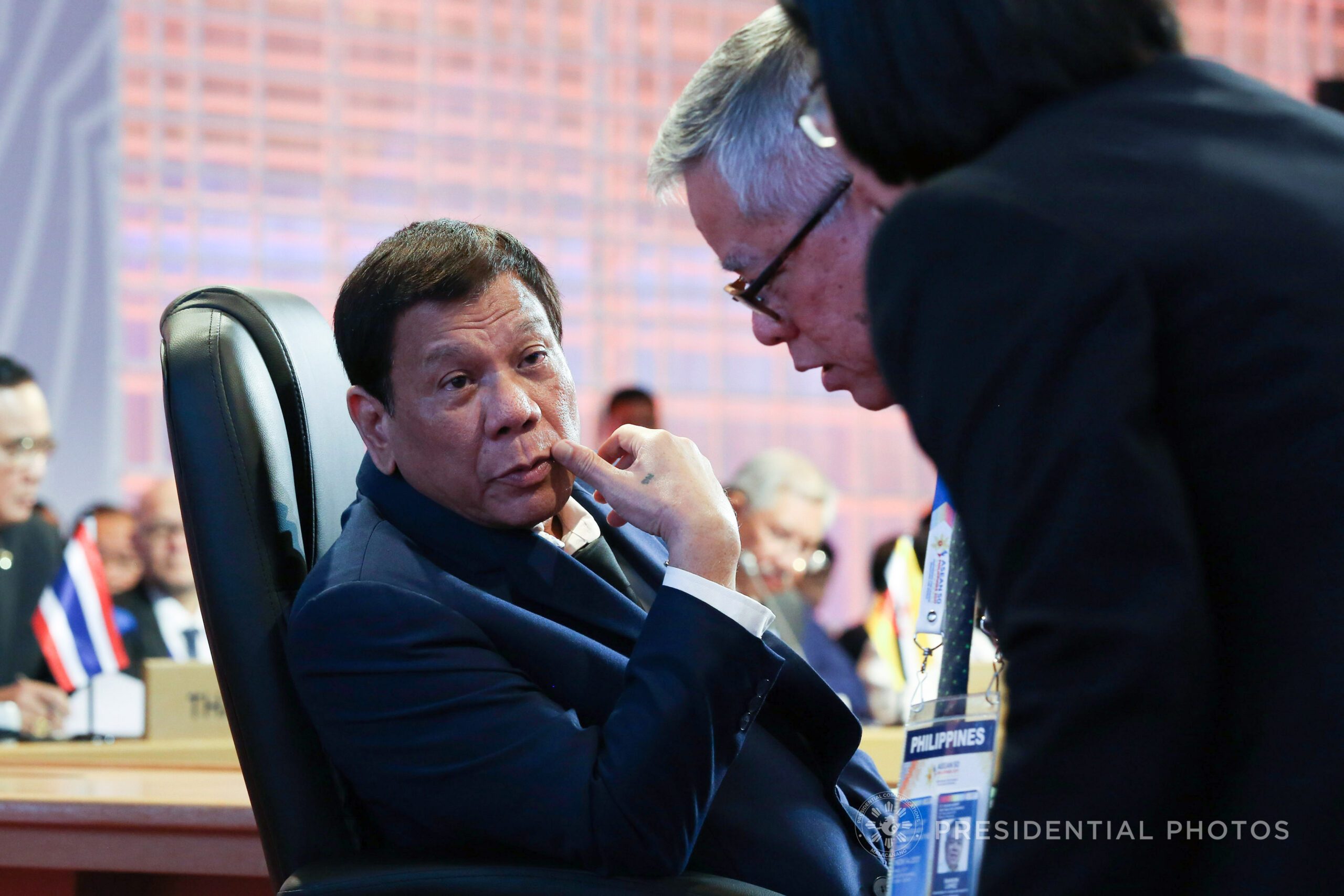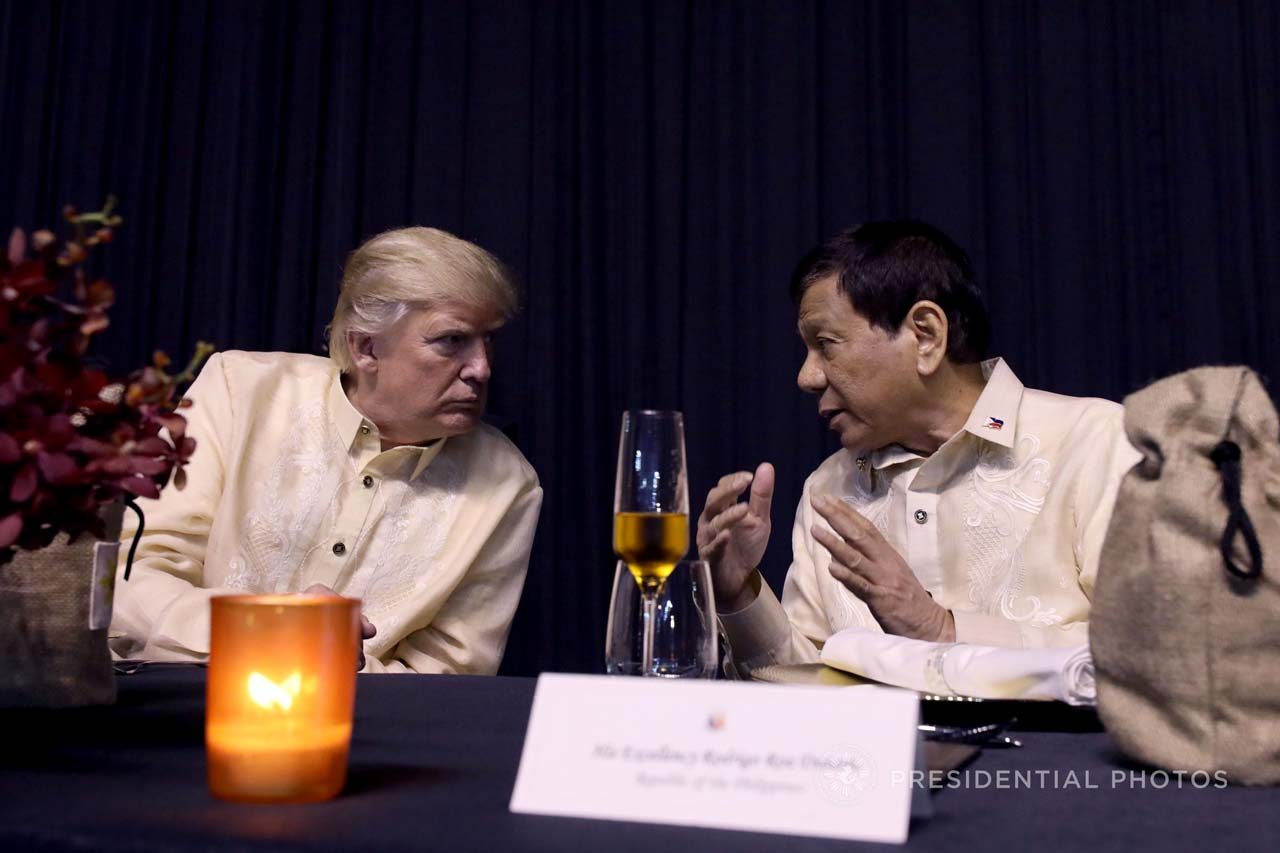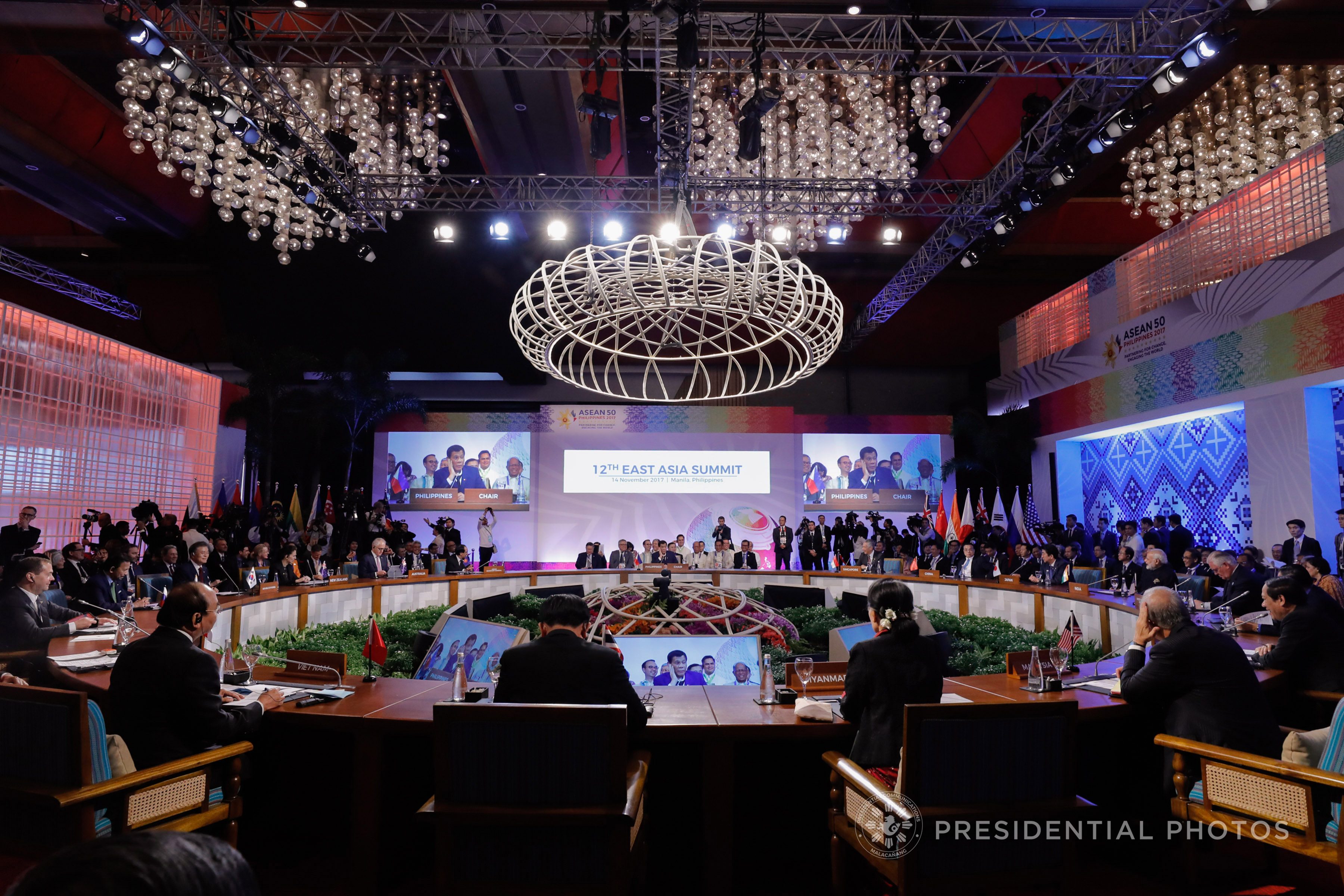SUMMARY
This is AI generated summarization, which may have errors. For context, always refer to the full article.

MANILA, Philippines – Back in April this year, President Rodrigo Duterte had joked at the end of that month’s Association of Southeast Asian Nations (ASEAN) Summit that he wanted to cancel the much larger Summit in November.
Fast forward to Tuesday, November 14, Duterte and the Philippines managed to pull off the yearlong chairmanship and hosting. He symbolically handed over those responsibilities to Singapore and its Prime Minister Lee Hsien Loong.
What happened the year ASEAN was under Duterte’s helm?
The country and the world saw a more statesman-like Duterte. The Philippines, previously Southeast Asia’s strongest voice against China’s aggression in the South China Sea, has become its “good friend.” The United States elected a president leaning towards protectionist policies, while a North Korean leader has threatened annihilation with his “toys.”
All this, while human rights concerns in the region take on a worrying tenor – the Rohingya refugee crisis, Thailand’s continued military rule, and Duterte’s own bloody war against drugs.
ASEAN Summits served as a critical stage for Duterte. It was in last year’s 29th ASEAN Summit and Related Summits when Duterte made his international debut as the country’s top diplomat. The 30th ASEAN Summit was the first international gathering he hosted. This November’s 31st ASEAN Summit and Related Summits was an even grander affair, with world leaders from outside Southeast Asia in attendance.
The ASEAN Summits have been a crash course of sorts for Duterte, who, having spent most of his life as a local executive, did not have any major experience in international issues or diplomacy.
Duterte underwent long ASEAN briefing sessions and had to do some voluminous reading to better understand regional issues like economy, trade, the South China Sea dispute, and security.
The ASEAN Summits whipped Duterte’s diplomacy and protocol-following skills into shape, something of a learning curve for the casual-dressing, rough-tongued leader.
True enough, analysts found Duterte was able to play the part of a “conventional” ASEAN Summit host.
“This is a Duterte that is more statesmanlike than we’re used to. Sticking to the talking points, you can see he’s actually following the speeches, there was no cussing, no unconventional kind of rhetoric,” geopolitical analyst Richard Heydarian told Rappler.
Jay Batongbacal, associate professor at the University of the Philippines College of Law agreed: “Generally [he] followed the script, no major controversies, very dignified, almost, until last night.”
He was referring to Duterte’s rant against Canadian Prime Minister Justin Trudeau who had raised the issue of extrajudicial killings during a pull-aside meeting.
But Duterte, at least, deferred any railing to after all the major Summit events, and reserved it for an audience of reporters, instead of an audience of world leaders.
It should be recalled that in his first ASEAN Summit, Duterte shocked a roomful of leaders and diplomats when he spoke “passionately” about how American soldiers massacred Muslims in Sulu in the early 20th century. It was his comeback to then US President Barack Obama for voicing concern about his drug war.
The Trump factor
That kind of undiplomatic behavior to a US president is in stark contrast to his rapport with US President Donald Trump, among the most-awaited participants at the November summit.
The conviviality apparent from the interaction between Duterte and Trump did not surprise Batongbacal.
“It was hard for [Duterte] to not make a good impression with Trump since they are more or less the same kind of leader – populist and nationalist,” he said.

But Heydarian pointed out this apparent mutual like was also contained within certain uncrossable lines.
Duterte and Trump did not do the former’s signature clenched-fist gesture (which an Australian official had gotten into trouble for doing before). He appeared to even have avoided it in a photo with Philippine police chief Ronald Dela Rosa by doing the thumb’s up sign instead.
Instead, rapport was shown in safer ways – Duterte singing at the gala dinner upon the “orders” of Trump, the two seated beside each other in the Summit’s major events, Duterte’s sheepish smile after Trump complimented his singing.
Duterte, at his closing press conference, even made the effort to explain that his dislike for Obama did not translate into dislike for the US government as a whole and Americans in general – even if he previously called the US a “lousy” country and described Americans as “loud” and “obnoxious.”
What the Trump-Duterte interaction did was to “stop the hemorrhaging” in bilateral ties caused by the frosty relations between the Philippine leader and the former American president, said Heydarian.
Soft-pedalling on China
But the biggest temper to warming US-Philippine relations is Duterte’s continued courtship of China.
This courtship drastically influenced Duterte’s chairmanship of the ASEAN, and consequently, the stance of ASEAN as a whole to the simmering South China Sea dispute.
Both Batongbacal and Heydarian think the ASEAN Chairman Statements released under the 2017 Philippine chairmanship took a softer stance against China’s aggression compared to the statements issued last year when Laos was chairman.
“You have an embarrassing situation whereby the Philippines is competing with Cambodia as the friendliest ASEAN chairman as far as the South China Sea,” said Heydarian.
The statement released after the November summit avoided any reference to reclamation activities and the Hague ruling won by Manila against Beijing.
The same can be said for the Chairman’s Statement released in April, though it “took note of concerns expressed by some leaders over recent developments” in the South China Sea.
Philippine Foreign Secretary Alan Peter Cayetano admitted that the Philippines was among the countries who didn’t want China’s aggressive behavior mentioned in a statement released by ASEAN foreign ministers in August.

In fact, under the Philippines’ ASEAN chairmanship, the South China Sea issue has been “relegated to the backseat,” said Batongbacal, who is also director of the UP Institute for Maritime Affairs and Law of the Sea.
This is partly also because of other urgent security matters like North Korea’s missile launches and terrorism.
But the only related outcome this year was the finalization of the framework on the South China Sea Code of Conduct which, Batongbacal said, is all bark and no bite.
Without a set timeframe and venue for the start of talks on the code itself, everything appears “up in the air.”
“For me, personally, it’s nothing. It’s not substantial at all. It’s just some kind of procedural agreement,” said Batongbacal.
All this despite the Philippines’ resounding legal victory against China’s expansive claim in the South China Sea, which had put the country in the position to issue stronger statements against the Asian giant.
With that position deliberately not taken, analysts ask what is the Philippines getting in exchange for soft-pedalling on the issue?
The opt-repeated government line is that China is pouring aid and grants and offering favorable loans. The improved economic relations, manifested in more trade and higher tourist arrivals, is also touted by both governments as significant gains.
Instead of focusing on the maritime dispute, Duterte put the spotlight on issues where consensus is strongest, and which personally resonate with him more: the fight against terrorism and transnational crime.
War on drugs
Being Duterte’s obsession and his administration’s most visible program, the war on drugs was a definite undercurrent during the Philippines’ ASEAN chairmanship.
Many were waiting to hear if any leader participating in the major summits would raise the issue that has earned Duterte notoriety in the international community.
Prime Minister Trudeau did bring it up, and got the corresponding blustery comeback from Duterte. New Zealand’s new prime minister Jacinda Ardern expressed concern about it to the media and intended to bring it up with Duterte.
But the rest of the leaders, including US President Donald Trump, chose not to bring it up or only mentioned it in passing, without taking a concrete stance. (READ: Philippines, U.S. give conflicting statements on Duterte-Trump meeting)

Even the European Union, in the form of its representative European Council President Donald Tusk, avoided the issue, at least in public.
This, said Heydarian, was the ASEAN chairmanship’s greatest “diplomatic gift” to Duterte.
“None of them confronted him on the human rights issue. That was the biggest diplomatic gift to Duterte, hosting global leaders and having these global leaders actually chumming up to him, embracing him, being nice to him, including Donald Trump,” said Heydarian.
Whether intentionally or not, Duterte was able to benefit from the ASEAN hosting by showing, both to Filipinos back home and to the world, that he is not being isolated. In a way, said Heydarian, the Summits helped to “legitimize” him despite all the controversy.
The ASEAN chairmanship is handed to countries on a rotational basis. The next time the Philippines will assume the role is 10 years from now because ASEAN consists of 10 member states.
In a way, it was a stroke of luck for Duterte that the ASEAN chairmanship fell to him in his first full year in power.
He may complain about the stifling formalities and the tiring schedule, but the ASEAN hosting was invaluable to him and his government.
His political will in addressing the threat of terrorism and other security issues was helpful, but it’s not difficult to achieve a consensus on such matters. Everyone wants to fight terrorism and crime.
It remains to be seen if ASEAN’s softer stance on China, a by-product of Duterte’s chairmanship, will do the regional bloc good in the long-term. – Rappler.com
Add a comment
How does this make you feel?
There are no comments yet. Add your comment to start the conversation.